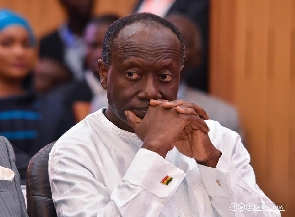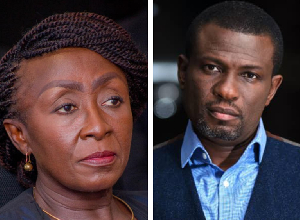GhanaWeb Feature
Ghana’s finance minister, Ken Ofori-Atta was nominated by President Nana Addo Dankwa Akufo-Addo in 2017 and was renominated after the governing New Patriotic Party (NPP) retained power in the 2020 elections.
Ofori-Atta assumed office as Minister of Finance on January 27, 2017, and has served in that capacity for almost seven years.
However, the current government is suffering economic difficulties which have prompted calls for the head of the minister citing his role in the suffering Ghanaians are experiencing.
The government, on the other hand, has argued why the current economic problems cannot be entirely blamed on poor economic administration but rather partly on external forces that are beyond the control of the government.
Pointing to the COVID-19 outbreak and the conflict between Russia and Ukraine as the key external drivers of the economic crisis.
Calls for the head of the finance minister intensified when the government announced plans of seeking an International Monetary Fund (IMF) bailout.
Generally, the opposition party accused the minister of misleading Ghanaians because the latter had stated on various occasions that the government wouldn't seek the IMF's assistance, which in their opinion was a sign of incompetence and mistrust on the part of the minister; hence their call for his resignation or dismissal.
Meanwhile, the minister still holds his position despite several requests for his resignation and various attempts to have him removed from office.
GhanaWeb compiles five possible reasons why the minister still remains in office.
1. President Akufo-Addo’s refusal to sack the minister
Akufo-Addo has come under public backlash for his decision to keep the minister in his position.
It may be recalled that some 88 Members of Parliament held a press conference on Tuesday, October 25, 2022, to voice their disquiet and demanded the head of Ken Ofori-Atta and the Minister of State at the Ministry of Finance, Charles Adu Boahen.
The MPs demanded the resignation of Ken Ofori-Atta over the failing economy.
After meeting with the president and the national leadership of the NPP, the rebel MPs agreed to cooperate with the minister to present the 2023 budget, see to its appropriation and to also reach an initial agreement with the IMF.
The stated conditions have since been met and some of the rebel MPs have stated that they are waiting on the president to act on the agreement reached with the MPs.
2. Parliament’s failure to remove the minister
The finance minister was referred to an ad-hoc committee of parliament for a vote of censure brought against him by the Minority Caucus.
However, the committee, at the end of their hearing said that they did not make any specific findings at the end of their job.
Presenting the report to parliament on December 8, 2022, co-chairman Kbina Tahir Hammond said: “the committee was not able to come out with any findings.”
Subsequently, the vote of censure failed because the majority caucus left the chamber during the voting and according to the constitution, the destiny of the minister must be decided by two-thirds of the house.
Before walking out, the leader of the majority side, Osei Kyei-Mensah-Bonsu said that his group is washing its hands off the process to remove the finance minister because it did not follow due procedures.
3. The family dynasty
President Akufo-Addo has been accused of feeling reluctant to relieve Ken Ofori-Atta of his post because of they are related by blood.
Ofori-Atta is president Akufo-Addo’s cousin and the president is reported to be loyal to his family members hence the unwillingness to sack the embattled minister.
The Member of Parliament for Subin, Eugene Antwi, said in an interview that the president is being blinded by his relations with Ofori-Atta.
“New Patriotic Party, (NPP) is running a democracy and not a family dynasty. I do not think it is too much to ask the President to ask two people to step aside from his government,” he said.
But president Akufo Addo speaking in an interview with OTEC FM on Monday, October 17 2022, said he has full confidence in the Minister.
He insisted that Ofori-Atta cannot be blamed for the current economic woes the country is facing.
“I came to office in 2017 under a stringent IMF programme. This same man was able to manage the affairs of our economy in such a way that in my first term, we were one of the fastest-growing economies in the world.
“An average growth rate of 7% which allowed us to initiate programmes such as Planting for Food and Jobs. So, somebody who has been able to do that. The current difficulties are not his fault. So how do I do it (sack him)? What will be the basis? What will be the rationale,” the president said.
4. IMF deal
In the meeting with the rebel MPs last year, president Akufo-Addo is reported to have told the MPs to allow Ken Ofori-Atta a seal an IMF bailout for the country before his furture is decided.
Reports and media statements by some persons who attended the meeting were that the president is convinced a deal could be reached with the IMF and a decision will be made afterwards.
Even though the MPs insist Ofori-Atta was tasked to deliver an initial agreement (i.e. a Staff-Level deal which was reached last December) others have interpreted the president's words as completion of the IMF talks.
AM/SARA
General News of Thursday, 16 February 2023
Source: www.ghanaweb.com

















